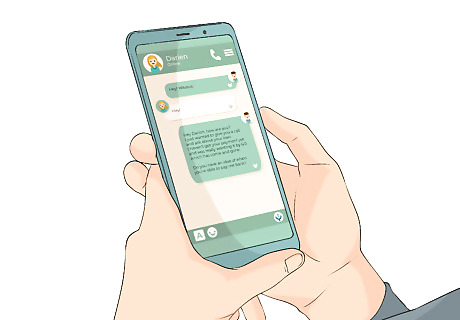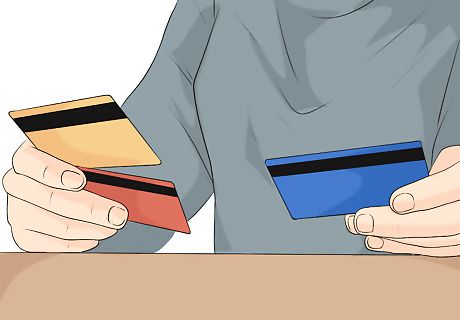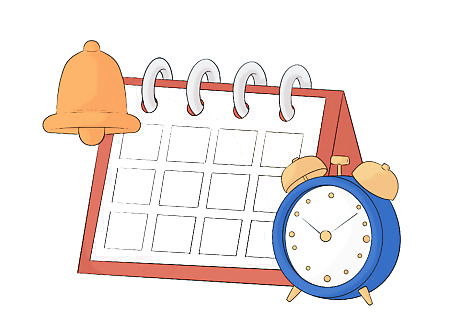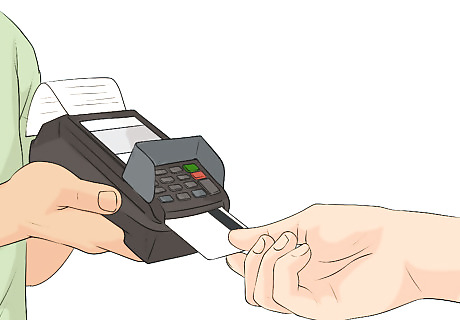
views
- Email a short, friendly reminder message 1 week before the deadline. Include the due date, the payment amount, and all the ways they can pay.
- Write a firm but polite email each week after the due date has passed. Remind the person how to make the payment and if it starts accruing interest.
- Call your client or friend if they haven’t responded to your emails. Be professional and tell them that the deadline is overdue and that you’d appreciate payment ASAP.
Reminding a Business Client to Pay

Email a friendly reminder 1 week before the due date. If your client hasn’t paid you before the due date, send a short, polite email to gently remind them about the payment amount, due date, your terms, and payment options. Just use a professional tone and include “Friendly” in the subject line or body of the message so they understand you’re not accusing them of being forgetful or intentionally not paying you. For example, you might email, “Subject: Friendly Reminder - Invoice #1234 Due on 6/5. Hello Lukas, I hope you’re doing well. This is a friendly reminder that payment for invoice #1234, which was sent on 5/26, is due on 6/5. You can pay your bill online at [link] or send a check to our offices at [address]. Please find attached a copy of your invoice for your convenience. If there’s anything I can do to help this process, please let me know. Best, [your name].”

Type a friendly, professional message on the day payment is due. Stay polite and kind even if your client hasn’t paid off their debt by the due date. Things come up and they might’ve gotten busy, so don’t use language that assumes they’re avoiding you or attempting to not pay. Just write a quick reminder telling them what they owe and how they can pay for it. For example, email your client, “Subject: Friendly Reminder: Invoice #1234 is due today. Hello Nadine, This is just a reminder that your payment on invoice #1234 that we sent on 5/26 is due today, 6/5. You can make your payment online at [link] or to the bank account indicated in the invoice, which is attached. If you have any questions about making your payment, please let me know and I’m happy to clarify. Best, [your name].”

Send weekly reminders after the payment is overdue. While it can definitely feel uncomfortable to remind a client to pay you, remember that it’s your money that you’re owed. When a payment becomes overdue, stay polite but direct in your message. Even if you’re frustrated on the inside, keeping your cool makes your client more likely to respond and pay. If you’re charging interest on the payment after a certain period of time elapses, include that in your message as well. For example, say, “Subject: Action Required - Payment for invoice #1234 is overdue. Hi Adam, I am emailing you to inform you that your payment on invoice #1234 is overdue according to our records. Per our terms, I will start charging 5% interest if the invoice is still unpaid after 6/15. I have attached a copy of the invoice for your convenience. As a reminder, we accept payments online or paid to our bank. If you have already sent your payment, please disregard this message. Thank you for making this a priority and please reach out if you have any questions. Best, [your name].”

Call the client if they aren’t responding to emails. Use a professional and polite tone when calling a client to remind them about their payment. While it can feel like they’re ignoring your messages, it’s possible that your reminders got buried under other emails or were sent to spam. Don’t place any blame on your client and simply state the payment terms you agreed on and how they can pay you. When you call, introduce yourself and say that you’re calling about their late payment. For example, say something like, “Hello Ted, this is [your name] calling from ABC Marketing. Thank you so much for your business with us. As a courtesy, I just wanted to let you know that your invoice #1234 was due on 6/5 and is now considered overdue according to our records. We would greatly appreciate payment at your earliest convenience. As you might remember, we accept payment online and by check.” If you can’t reach your client, simply leave them a message and ask them to call you back when they have time.

Offer a discount if the client is still not paying. While it’s not ideal to get less than you’re owed, it’s better to get something back. If you’ve followed up with your client about their overdue payment more than 3-5 times, send a final reminder stating that you’ll offer them a discount on their total if they pay in a certain amount of time. Reducing the total payment can incentivize a client to pay up. For example, email a client, “Subject: Invoice #1234 Overdue Payment Notice. Hello Enid, I hope this email finds you well. I am writing to remind you about your payment on invoice #1234 which was due on 6/5. According to our records, your payment is now overdue. You can pay your invoice online at [link] or through our bank; this information is in the attached invoice. If you make your payment within 48 hours, we will apply a 10% discount. I look forward to hearing from you about this matter. Please reach out if there’s anything you need from me. Best, [your name].” Alternatively, offer a discount if they pay you before the deadline. You might give a 10% discount if they make their payment within 48 hours of your initial email.
Reminding a Friend or Family Member to Pay

Email or text a gentle reminder before and on your payment deadline. If you loaned a friend or family member a large amount of money, send them a friendly reminder to pay it back as soon as possible. It can feel awkward to ask for your money back, but communicating to them early helps ensure that you get it. Just be polite and clear about the deadline you set and how they can make their payment. For example, you might message, “Hey Josie, I just wanted to send you a friendly reminder about your loan that is due on 6/5. I am flexible in terms of payment, so feel free to Venmo me at [username] or pay with cash. If you have any questions, concerns, or if there’s anything I can do to help, please let me know.” On the due date, text, “Hi Ravi, I hope everything is going well! I just wanted to send you a friendly reminder that your loan of $1,000 is due today, 6/5. You can send me your payment on Venmo or PayPal at [username] or transfer it directly to my bank. Let me know if there’s anything I can do to help out.” If a friend or family member is paying you back for something smaller, like a meal, send them a quick text like, “Hey, just wanted to check in about the dinner I bought you last week. Is there any way you can pay me back soon? Venmo or PayPal works for me.” If you requested money from someone on Venmo, remind them through the app by clicking your profile, pressing the incomplete notification on the right-hand side, and tapping “Remind.”

Ask when you can expect payment if they’re past the deadline. If your friend or family member missed their payment deadline, stay calm when you text or email them. While it’s understandable that you’re frustrated, sending a passive-aggressive message might make them defensive and unlikely to pay. Just be direct and kind by reminding them about the deadline and any fees or interest rates associated with being late. For instance, say, “Hi Kenya, I just wanted to remind you that your payment was due on 6/5 and it is now 1 week overdue. When do you think you can pay me back? Either Venmo, PayPal, or a bank transfer is fine with me. Please let me know if there’s anything I can do.” If a friend is paying you back for a small item or meal, shoot them a text like, “Hey, remember how I spotted you $30 last month? Are you able to pay that back now? Venmo or PayPal is cool with me.”

Call or talk in person if your friend or family member isn’t paying. If weeks have gone by and your friend or family member still hasn’t paid you, reach out to talk to them about it. Whether you’re in person or on the phone, remind them kindly about the amount they owe you and when you wanted it due. Then, ask when they can get you your money. For example, say something like, “Hey Darien, how are you? I just wanted to give you a call and ask about your loan. I haven’t got your payment yet and was really wanting it by 6/5 which has come and gone. Do you have an idea of when you’re able to pay me back?”

Bring up a friend’s loan in casual conversation to remind them to pay. If you’re not ready to directly ask a friend or family member about their loan, or they haven’t responded to your attempts, casually ask about what they said they’re using it for. This might subtly remind them that they still owe you and prompt a conversation about paying you back. For instance, if a friend borrowed $500 for a car down payment, you might ask, “Hey, how’s your new car?”

Negotiate a payment plan if your friend can’t pay the debt upfront. Be empathetic to your friend or family member’s situation, as they likely borrowed money because they’re in a tight spot. If you agreed on a due date and they can’t pay by it, ask how long they need or if they can pay you back a little each week or month. Staying flexible and communicative ensures that you get your money and prevents hard feelings that can harm your relationship. Either text, call, or meet your friend or family member in person. Be direct but kind and ask about the debt they owe and if you can come up with a payment plan to get it paid back. For example, you might send something like, “Hey, I just wanted to see how you were doing. I know that we talked about you paying me back by 6/5 and it’s now passed that. Do you know when you’ll be able to pay me? I’m happy to come up with a payment plan, like $50/month if that works for you–just let me know.”

Tell your friend why you need your money back. While getting what you’re owed is reason enough, letting your friend know that money is tight and their payment will help you make rent or afford your doctor’s bill might nudge them to pay you back quicker. They’ll likely realize that you helped them out in a tough spot and now it’s their turn to return the favor. If your friend or family member hasn’t responded to your messages, bring up that you’re short on cash in casual conversation. Or, shoot them a quick text asking if they can pay you back soon because you’re in a tight spot.
Best Practices for Invoicing Clients

Give your business client their invoice and payment due date upfront. When you sell your business services to a client, email them the specific deadline for making their payment and a copy of their invoice. Then, follow up to answer any questions and make sure they understand your terms. For example, email your client, “Subject: Invoice #1234 Due on 6/5. Hello Javier, I hope you are doing well. Please find attached the invoice for our social media marketing services. The invoice is due on 6/5. If you have any questions about the invoice, please do not hesitate to reach out. Thank you, [your name]”

Be clear about what happens if your client doesn’t pay. When going over your payment terms, be upfront about charging interest on the payment or suspending your services if it goes unpaid. In your initial email or message, make it clear after what date the consequences go into effect. For example, you might add, “According to our terms, I will charge 2% interest on your payment after it’s been overdue for 10 days, which starts on 6/15.” If you’re working with a new client, you might offer them more grace if they default on their payment. If you’re working with a repeat client who’s had trouble in the past, you might give them a warning that you’ll no longer take them on as a client.

Give clients different ways to pay online and in person. Only giving people 1 way to pay can make it harder for them and you—they might find your preferred method difficult which forces you to track them down. Instead, you might let your clients pay you online, like with a credit or debit card, or by sending you a check in the mail.

Schedule automatic, online reminders for your business. Setting up automatic reminder emails or text messages with invoicing software prevents you from having to chase clients down. Most invoicing apps let you customize your message and set the frequency that you want reminders sent out, allowing you to send reminders before, on, and after the payment deadline. When drafting an automatic reminder email or message, keep your tone professional, kind, and polite. Add personal elements like your company’s logo, a friendly greeting, and your signature so your clients are more likely to respond. If your company uses PayPal for payments, set up automatic invoices using their software.

Ask for a client’s payment upfront. When a client wants to purchase your business’ goods or services, ask for a down payment or the entire cost up front before you start working with them. This frees up the time you might’ve spent tracking them down to pay after you’ve started working for them, which gives you more time to finish their project and make money for your company.
Best Practices for Loaning Money to Friends and Family

Create a written agreement when loaning a lot of money. When you loan a large amount of money to a friend or family member, like a down payment on a home, write a loan agreement that details how you’ll handle payments, when they’re due, and whether you’ll charge interest or fees if the payments are overdue. While it might feel awkward to put your loan agreement into writing, it helps ensure that your friend or family member pays you and prevents any misunderstandings. To make payments easier, give your friends and family multiple ways to pay, like with cash, Venmo or PayPal, or a bank transfer. Generally, interest on personal loans falls under 6%. For instance, email your friend, “Hi Silvia, I am emailing you to formalize our lending agreement. I simply want to outline the payment terms to ensure we’re both clear on the expectations and to avoid misunderstandings in the future. You (Silvia) borrowed $1,000 from me on 3/5 to help pay for tuition. We both agreed that you will make a full repayment to me by 6/5. If you are unable to make the payment by 6/5, we agreed to charge $5 per week that the debt goes unpaid. Please email me back to confirm that you’ve read over and agree to these terms. If you have any questions, let me know.”

Reduce the payment if your friend covers meals and other costs. If your friend or family member is having a hard time paying you back in full, ask if they’re willing to reduce their debt by paying for small things you need. For example, if you and your sister are going to a concert, she might pay for your ticket. Then, you subtract the ticket from her total. Track your friend or family member’s payments and the new total in an online spreadsheet. Or, keep a running, written list. If you originally paid for something small, like a round of drinks, simply suggest that your friend buys the drinks the next time you’re out to pay you back.

Don’t lend friends and family more money than you can afford. As a rule, only give out money you don’t mind not getting back. While you expect the best from your friends and family, sometimes you have to consider the worst-case scenario. If loaning your friend $500 will prevent you from paying rent this month, it’s best to say no to their request. But if you can stand to lose $500, helping out your friend in need might be worth the risk. Saying no to a friend or family member can definitely feel tough. Being honest about your situation and ability to help prevents any miscommunication or hurt feelings that might arise if you did give them a loan that they don’t pay back. If you’re uncomfortable loaning friends or family money, keep it simple and kind with something like, “It’s not personal but I’m not comfortable loaning money to you. I wish you the best and I’m happy to help out in a different way if I can.”



















Comments
0 comment